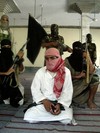Last night the Taliban launched coordinated assaults against Pakistani military checkpoints in the tribal agency of Mohmand, sparking fighting that resulted in the deaths of 11 Pakistan paramilitary troops and 24 Taliban fighters.
“About 150 Taliban militants attacked five Frontier Corps checkposts in Baidnami village near the border with Afghanistan,” a senior Pakistani security official told AFP.
The Taliban launched the attack in the middle of the night and fighting raged until the morning, when helicopter gunships were called in to break up the Taliban formations, The Associated Press reported.
Sajjad Mohmand, a Taliban spokesman for Mohmand, claimed that 12 members of the paramilitary Frontier Corps were killed and two were captured, and that the Taliban overran one of the checkpoints. But the military denied any of its troops are missing.
Today’s attack, and attacks since the end of the spring, show that the Taliban can still organize major attacks in Mohmand.
Since March 2009, the Pakistani military has twice claimed the Taliban have been defeated in Mohmand. But the Taliban have continued to control large areas of the tribal agency and launch attacks against security forces and pro-government tribes who oppose Taliban rule.
In June, Taliban fighters killed 10 Frontier Corps troops and captured 40 more during raids in Mohmand and the neighboring Bajaur tribal agency, where the Pakistani military has also claimed victory against the Taliban multiple times.
In July and December, Taliban suicide bombers killed 115 people and wounded more than 200 in a pair of attacks at a government official’s office where a meeting was being held to organize anti-Taliban tribes. The Taliban claimed credit for the attacks and said it would continue to target anyone who works with the government.
Mohmand Taliban under command of able leader
The Mohmand Taliban are commanded by Omar Khalid, who is a deputy of Hakeemullah Mehsud’s Taliban movement. Khalid is considered one of the Taliban’s most effective and powerful leaders in the tribal areas. He also maintains close ties to al Qaeda and is believed to have given sanctuary to Ayman al Zawahiri in the past.
Khalid gained prominence in Mohmand during the summer of 2007 after taking over a famous shrine and renaming it the Red Mosque, after the radical mosque in Islamabad whose followers had attempted to impose sharia in the capital.
The Mohmand Taliban took control of the tribal agency after the Pakistani government negotiated a peace agreement with the extremists at the end of May 2008. The deal required the Taliban to renounce attacks on the Pakistani government and security forces. The Taliban said they would maintain a ban on the activities of nongovernment organizations in the region but agreed not to attack women in the workplace as long as they wore veils. Both sides exchanged prisoners.
The Taliban promptly established a parallel government in Mohmand. Sharia courts were formed, and orders were given for women to wear the veil in public. “Criminals” were rounded up and judged in sharia courts. Women were ordered to have a male escort at all times and were prevented from working on farms. The Taliban also kidnapped members of a polio vaccination team.
In July 2008, Khalid became the dominant Taliban commander in Mohmand after defeating the Shah Sahib group, a rival pro-Taliban terror group with ties to the Lashkar-e-Taiba. The military claimed it killed Khalid in January of 2009, but the Taliban denied the report and he has since surfaced.
The Pakistani government has placed a $123,000 bounty on Khalid’s head.









3 Comments
This guy will be a “bone” the Pak’s throw us if we bark loud and long enough. This guy has to stopped. Dead.
When will the Pakistanis realize cuddling this blood thirty tyrants will come back to bite them! It is time they declared total war on the rebels and crush them once and for all!
It is not simple to manage with two issues one at time, particularly when you have to create the term paper essays. Only the do my paper service will deal even with the most hard tasks.